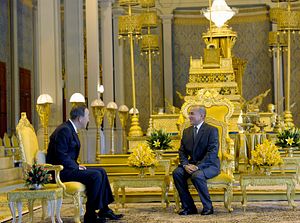Drastic cuts to HIV funding in Cambodia by international donors underscored the recent LGBT Pride Week, which has seen increasing numbers of gays emerging into public life as the country continues to rapidly normalize after three decades of war.
Cambodia is one of a few countries to win international recognition for its response to HIV/AIDS, acting quickly after it first erupted here at around the same time as United Nations peacekeepers arrived to oversee a restoration of elections amid civil war in the early 1990s.
But success in diagnosing and treating patients early has resulted in international funding being scaled back by the two largest donors, the Global Fund and USAID, which have also imposed stricter conditions on financing, including a requirement that the government increase its contribution each year.
“Our study in 2015 found that 2.3 per cent of homosexuals, especially gay men, are HIV-positive. This rate is still much, much higher when compared to ordinary couples,” said Choub Sokchamroeun, Director of the HIV/AIDS alliance, KHANA.
Royal Support
Cambodians have traditionally shunned the gay community, and LGBT practices are often viewed as being against nature and a threat to rebuilding the social order in the aftermath of three decades of war, which obliterated the country’s social fabric.
Overcoming prejudices was initially tackled by the late King Norodom Sihanouk, who in 2004 was widely applauded for supporting the LGBT community and same sex marriage. That stand has remained unchanged under current King Norodom Sihamoni.
Since Sihanouk expressed his support, the pink economy has flourished, with LGBT-friendly bars and coffee shops opening alongside a fledgling gay media and entertainment industry, while activists have organized themselves into non-governmental organizations (NGOs).
But despite royal support many LGBT individuals still face abuse at home, in school, and in the workplace. Many are rejected by their families, sometimes bullied into a conventional marriage, while others are simply locked-up in their village homes until they recant.
This has hampered HIV/AIDS treatment where more funding is still needed if the goal to eliminate new HIV infections by 2025 is to be met.
UNAIDS Country Director Marie-Odile Emond has urged the government to invest at least $4 million in 2018, up from $1.5 million this year, to avoid any gaps in services.
“There’s still sufficient funding for 2017, but from 2018, unless the government increases its contribution, we are going to have a funding gap for services,” she said. “This year, promoting access to HIV prevention, early access to HIV testing and HIV treatment and care is one of the key messages promoted throughout the Pride Week.“
Film, art and photo exhibitions and dance – a mix of traditional Khmer with modern choreography – were also designed to challenge views that homosexuality is unnatural and against Cambodian traditions.
Pride Week also featured the World Premier of Under the Rainbow, about Sou Sotheavy – a transgender woman who survived the Khmer Rouge and post-genocide Cambodia by working as a prostitute. She was imprisoned, tortured, raped and forcibly married.
She said LGBT individuals are a minority and that like her they faced constant difficulties, including drug addiction, being HIV positive and discrimination.
“They are vulnerable and need attention not discrimination,” she said after the screening.
Look West
Like other minorities – particularly ethnic or religious – Cambodian LGBT individuals are looking to guidance from the West, where old norms regarding sexual orientation are being challenged, most notably in gay marriage and through the courts.
Chan Sambath, an event organizer with the LGBT community, said legal issues and precedents set in the West were now high on the community agenda to ensure LGBT individuals enjoyed the same rights as anyone else.
“We want to make sure that they have access to public health care, are given the same job opportunities based on their talent and skills. One of our main goals is to make same sex marriage legal,” he said.
Attitudes in Cambodia might remain troubled. But they do stand in stark contrast to intolerance towards the LGBT community elsewhere in the region.
While Cambodians were launching into the annual Pride Week, two gay men in Indonesian were lashed after they were convicted of having sex.
A sharia court handed down the sentence on International Day Against Homophobia and Transphobia, ignoring international pleas for clemency or at least some leniency.
It was a point not lost on Srun Srorn, an LGBT activist, who said positive change in social attitudes towards people with different sexual orientation needs to be driven by support from the village at the grassroots level.
“Change was started by NGOs and then the rural community. Private sector and government have also participated with us. We gather and share life and now we are more visible about being who we are,” he said.

































